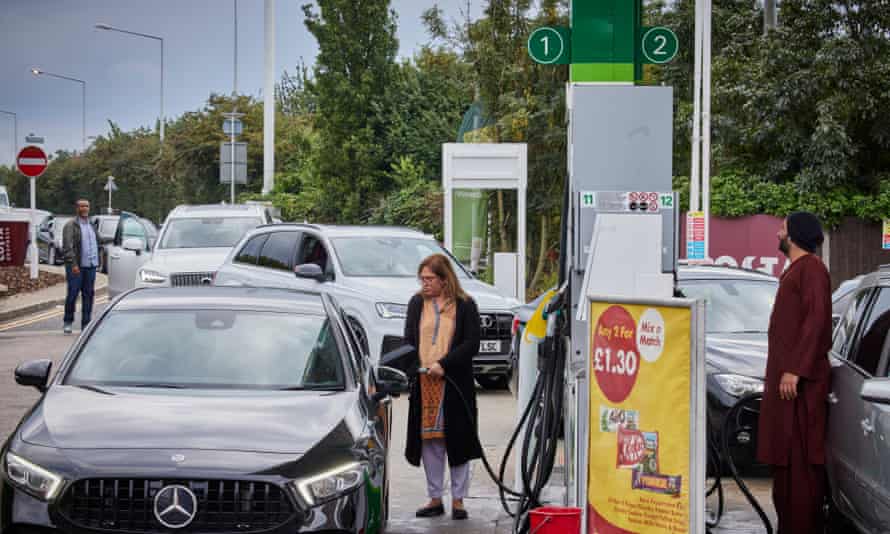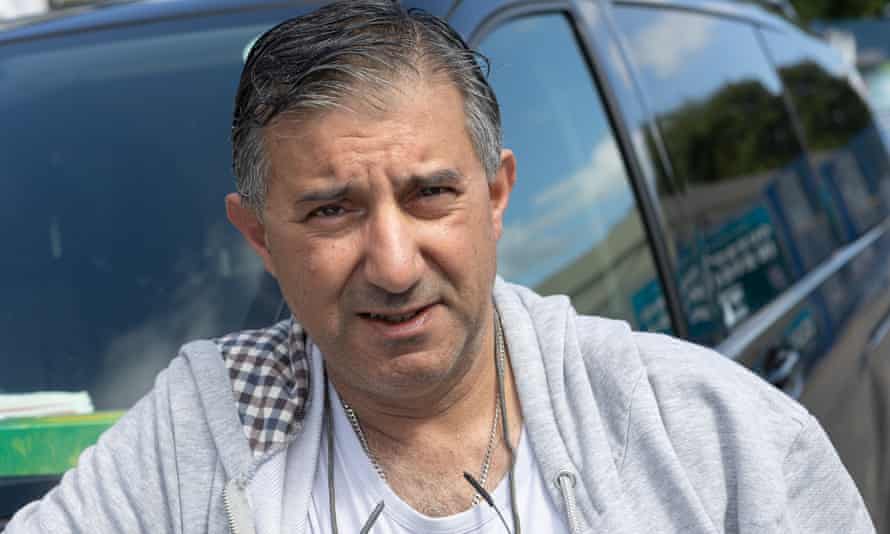The record spike in fuel prices could spark a mass exodus of staff who rely on their vehicles for work, trade unions and drivers warn.
On Thursday, the price of a litre of unleaded petrol hit 182.31p, meaning the cost to fill up an average family car with petrol hit £100 for the first time ever. Some employees who need to drive for their jobs are spending as much as £350 a week on fuel and others are “paying to go to work”.
The GMB trade union has warned that the hike has “crushed” its members and warned that shortfalls of staff in the transport and healthcare industries were “only going to get worse as prices continue to shoot up”.
One community NHS worker told the Observer that the fuel price rise had outstripped the NHS reimbursement for petrol, so staff were now paying to not just get to work but to drive to patient houses to do their job.
Tiffany, another community health worker, said fuel now makes up the largest chunk of her spending every month – nearly £250 – only £171 of which is reimbursed by the NHS.
She said the rising costs, mixed with the fact that NHS fuel reimbursement comes at the end of the month, had left her being loaned money by her partner.
“My whole team is exhausted,” she said. “The morale is the worst that it’s been for about 10 years. To be honest with you, I feel worse now than I felt during Covid. I could work at a till in Aldi and be paid more.”
The NHS waiting list in England hit a record high of 6.4 million people last month. The overall staff shortage at the service has hit an estimated 110,000.

The Observer also spoke to taxi and private hire drivers who were forced to take second jobs or work six-day weeks to deal with fuel costs.
“There’s lots of people that need help, and it’s not forthcoming,” said Paul Sweeney, a London taxi driver who is losing £300 a month on higher fuel costs, despite driving a hybrid electric vehicle. “Lots of people haven’t come back to the trade since Covid because of what’s happening. Where are we going to be in five years if this goes on?”
According to the most recent figures, the shortage of both Uber drivers and Black Cab drivers in London are both around the 10,000 mark after a mass exodus during Covid that drivers have said has continued to worsen.
Couriers and other van drivers have also been badly affected. Speaking to Radio 5 on Friday, one said: “It’s got to the point where I have made the decision to look for another job… I’m watching people who have been doing this for 16 years saying, ‘That’s it, it’s my last day’. When I filled up the other day it was £108 and I could have cried because I know how much work I’ll have to do now before I make any money.”
The UK inflation rate hit a 40-year high of 9% in April, with the Bank of England expecting it to hit 10% before the end of the year.
In October, the energy price cap is expected to rise 42%, from £1,971 to over £2,801, another increase on the £700 spike recorded in April.
“GMB members, like everyone else, are being crushed by sky-rocketing energy bills, big jumps in food prices and fuel at nearly £2 a litre,” GMB general secretary Gary Smith said.
“Record petrol prices now mean community NHS staff, domiciliary carers, taxi drivers and others who are on the road for their job, are literally paying to go to work. That can’t be right.
“It’s no wonder we’re seeing a massive shortfall of staff in many of those industries – and it’s only going to get worse as prices continue to shoot up.”
Christina McAnea, general secretary of Unison, warned on Friday that some of the union’s members were likely to go on strike in the coming months as a result of the higher costs.
“We don’t want to bring low-paid workers out on strike,” she said. “But if there’s no alternative, what else can people do?”
Priced out of work
Nader Awaad
Uber driver Nader Awaad told the Observer he is now spending £350 a week on fuel and has had to take on other jobs to try and make ends meet.
He said that the hike in fuel prices, alongside alleged changes to the share of each fare given to drivers, meant he can only afford to accept 8% of rides offered to him on the app. The other 92% are too short a distance for him to make money.

As a result, he said that he has now had to take on a second job doing airport pick-ups and drop-offs that has left him working from 8am to 11pm.
“Most of the drivers are in the same boat. Uber does not want their prices to reflect the rising costs because they want to maintain the idea they’re cheap and affordable,” he told the Observer. “How can you work for a company if you reject more jobs than you take on?”
Previously Awaad, who is an organiser for the IWGB trade union, would pay just £200 a week to put fuel in his Mercedes people carrier.
“That’s money I’m losing from my overall income,” he says. “It’s very challenging right now [to make ends meet]. We have to continue working, we have to continue making a living, we have to continue fighting.”
Vicki
“We’re in that situation where we just can’t afford to keep driving to do our work for free,” said Vicki, an NHS community maternity support worker.
For her job, Vicki visits patients in their homes, often driving for as much as 50 minutes between visits.
While the NHS offers reimbursement for fuel of 20p per mile after the first 3,500 miles, fuel now costs 22p per mile based on the average car’s fuel consumption, meaning Vicki and her colleagues face paying to do their jobs.
“I spend more time in the car than I could spend in people’s houses some days,” she explained, adding that she and her colleagues regularly drive more than 10,000 miles a year for work. “We’re pretty short staffed so we’re all having to drive extra miles. We’re driving 45-50 minutes for one visit. Especially as we’re in rural areas.”
Vicki added that even in normal years the change in subsidy would “cripple” NHS community support staff, but that the hike in fuel prices had left her and her colleagues on a knife-edge.
“You feel like you’re watching your dashboard and fuel gauge as you drive along, trying to drive at the best mileage,” she told the Observer. “You feel like you’re letting your colleagues down when they’re asking you to go somewhere and [you] have to say ‘I’m on 20p a mile, and that’s 45 minutes away, can someone else go?’.”
“I feel like we’ve been forgotten about,” she added. “There was the clap for a key worker but now people are not thinking of key workers who are struggling to put £100 a week of fuel in the car.”
